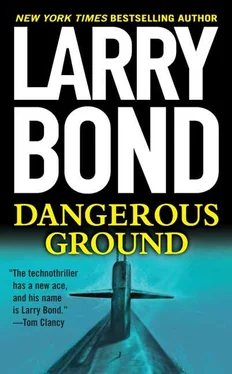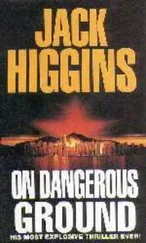At dinner that evening, some of the officers began to talk about the trip home. Four more Manta and ROV sorties over the next two days would cover the bay, and then they’d be finished.
Dr. Patterson listened to the conversation quietly, but Jerry could see she was not happy. She hadn’t been all day and now she spoke. “Captain Hardy, I’d like to extend the survey.”
“What?” Hardy’s surprised outburst caused the officers to jump out of their seats.
“I want to add some more sites to the search plan, perhaps even cover another bay.”
“Doctor, I can’t see the point of remaining here any longer. It only increases the risk of the Russians…”
“But we haven’t found what we were looking for!” she interrupted.
“Doctor, you’ve surveyed four previously known dumps and located over a dozen new ones. We’ve collected samples and photographic evidence.”
“It’s not enough. We’ve been looking for evidence of new waste being dumped or that the old waste had been entering the environment in significant amounts and we’ve found neither.”
“Maybe it’s not there to find.” Hardy’s bland statement was logical, but Jerry knew the effect it would have on Patterson. If it was true, then her plans were ruined.
“And maybe we just haven’t found it yet. We’ve only surveyed a fraction of the coastline. With more time…”
“Which we don’t have,” Hardy reminded her sharply. “You were on a tight schedule. We increased speed to get here, and we’re going to have to hurry on the way back.”
“Even an extra day would help. I know there’s that much margin.”
“Which means, what, another two or three Manta sorties? We’ve done twenty so far and have another four planned. What will two more provide us in terms of definitive evidence?” Hardy softened his tone slightly. “Doctor, you’ve convinced me of the danger to the environment that these dumpsites presents, but maybe it will take longer than you think to spread.” Paterson’s expression showed how worried she was that Hardy might be right.
Jerry expected Patterson to order Hardy to comply, to threaten him if he didn’t cooperate, but she simply sat there, silently. Finally she said softly, “I’ll just have to hope we find more in this bay than we did in the others.”
The next day Jerry’s Manta began searching Techeniye Guba. Within an hour, he found a cluster of spent fuel canisters. On the second sortie, a pile of junked pumps and other propulsion-related machinery. The ROVs’ investigations showed that neither presented the kind of immediate threat that Dr. Patterson was now longing for. Disappointed, she pushed Jerry hard to keep the Manta out as long as possible and shared her frustration with anyone that came within earshot.
On the second day, during the third Manta sortie, Jerry picked up a large contact on the sonar. It was so large it couldn’t be anything but a barge or a small ship of some sort.
“Maybe it’s a submarine,” Patterson speculated as Davis sent Huey to investigate. She’d come to the torpedo room as soon as Jerry had reported the contact, even though there was little she could do. She double-checked Davis’ navigation and went over the battery figures to compute how much time they’d have once they got there. Finally a request from Hardy for her to return to the control room left Jerry and everyone else grateful for his intervention.
Jerry’s Manta took up its customary protective circle while Huey approached the contact. Emily kept the ROV well away from the seabed, both to keep from stirring up the bottom and so they could get an overall look at whatever it was.
About twenty feet away, the ROV’s camera finally revealed the edge of a large structure. Stanchions and lifelines identified it as some sort of vessel. She passed the camera down its flat sides to a square-cut end. After some inspection, they were able to determine that it was the stern.
The radiation count was low, barely above background — just a faint gamma count. “So whatever’s in there is either well contained or there is very little in terms of radioactive material,” Jerry surmised. More disappointment for Dr. Patterson.
But what was in there? Patterson’s voice joined them on the circuit, impatient with passing questions through a phone talker. As they speculated, Emily Davis continued to search the exterior of the barge with the ROV’s camera. It was a lot like looking at an elephant through a keyhole. If she moved far enough back to get a larger view, the water completely obscured her view, so she was limited to examining one small patch of the hull at a time.
The barge carried no markings, which was not unusual. The almost complete absence of marine growth and corrosion indicated that it had been there for only about ten years or so. “So the late ‘80s or early ‘90s, right?” Davis asked on the circuit. Patterson concurred.
It had settled neatly on the bottom, scuttled by what appeared to be ballast-tank-like sections along the fore and aft ends. The top of the barge also appeared to have what looked like valve connections, possibly for compressed air lines or to attach a pump of some sort. Whatever this barge was, it looked like it was made to be recovered.
“But what is it?” Patterson asked over the circuit. “The Soviets built specialized barges to hold spent fuel containers. This isn’t the same design.”
The deck of the barge was covered with three hatches, presumably leading down to the cargo hold. One of the hatches lay partially open, leaving a small opening that managed to look both inviting and menacing at the same time.
“Probably popped open by a buildup of air pressure as the barge sank,” speculated Davis on the circuit.
“We’ve got to take a look in there,” Patterson declared.
Howard, the enlisted phone talker, added, “Captain Hardy says ‘Do not go into the hatchway.’”
Patterson’s voice was just as insistent. “I’m sure we can maneuver the ROV inside.”
Davis tried to speak. “Dr. Patterson, the ROV. ”
Howard’s voice came on again. “Captain Hardy wants to see Dr. Davis in control right now.”
Davis replied, “Tell the Captain I can’t leave my station while the ROV is operating.”
There was a pause on the circuit, and then Howard said, “Captain Hardy and Dr. Patterson are on their way down.” His tone carried the message, “Look out.”
Although Memphis was at patrol quiet, with all normal machinery operating, Jerry heard them coming before they even got to the torpedo room. Hardy’s voice carried through the door forward. “…will not risk losing…”
Dr. Patterson cut him off. “If we don’t take a few risks, we won’t accomplish our mission.”
“Madam,” answered Hardy sharply, “we’re submerged in poorly charted shoal waters, sending remotely operated vehicles into Russian territory so we can survey radioactive waste. That’s quite enough risk for me.”
Patterson burst through the door first and immediately started grilling Emily. “Dr. Davis, how hard would it be to send the ROV through that opening to see what’s in the cargo hold? I told the Captain that there would be little or no risk, because of your skill with the vehicles.”
Flustered by the question, Davis delayed. “There are many risks we have to consider. Beyond the obvious one of snagging the cable or breaking it, we don’t know how well Huey will be able to maneuver if we go inside. And how stable is the cargo? Will he be trapped by debris? It might be dislodged by the wash from the thruster. And the silt in there could make it so murky we’d be blind in any case.”
Hardy pounced on her statement. “So you think the risks are too great.” He sounded satisfied. Patterson managed to scowl at both Davis and Hardy at the same time.
Читать дальше












